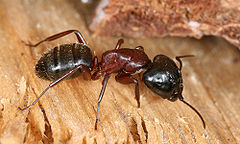Ant season is upon us once again. Carpenter ants are tenacious and once they start a nest, it can be hard to terminate. Prevention is the easiest counterattack: If you can keep them from establishing a foothold, you will be better able to protect home and property. Remove any wood scraps and tree stumps from around your home. Sheets of plywood, old tarps, pallets, and anything else that gives ground cover, particularly if it is moist, can provide a staging area for ants.
Once they gain entry to the house at ground level, ants will often start a nest in an area that is damp or prone to decay. Crawlspaces, basements, and any other moist spots will be especially attractive. They also like rim joists, areas where decks are attached, and areas around improperly flashed windows. Ants do not eat wood, but tunnel into it to make their nests. So rigid foam board, which is often used around foundations, also presents an appealing target. Even though ants prefer moist areas, they will also build nests in walls, floors, and even work their way into roofs.
Pick your poison
A mature colony will have a main nest and additional satellite nests. If the ants can be traced back to the main nest, then a localized dose of ant poison can be very effective. Many ant poisons are extremely toxic and if you are considering buying a product, research the long-term effects and handling precautions online. Chemical poisons may work well, but do not score high on a health and environmental scale, especially if pets or children could come into contact with them. Some insect poisons break down slowly and can be absorbed into the food chain by plants and animals or dispersed by rain and groundwater. So if you cannot locate the main nest, you should avoid sprinkling poisons liberally around the grounds in hopes it will kill the ants. Generally, chemical ant control should be left to a professional who can determine which product is best suited to a particular application.
Buying a bait
Many of the ant baits sold in local stores are designed for Lower 48 species of ants, which are primarily attracted to sweets. Carpenter ants are foragers that eat proteins (such as insects), so sweets will not appeal to them the same way. Look for bait specifically for carpenter ants on the shelf–it can be very effective.
If you buy an ant bait station and leave it exposed, it may attract pets, squirrels, voles, and other animals. Before you begin an ant attack, check with a local exterminator. Some may have access to good carpenter ant baits and contact poisons that are not available in stores.
When it comes to non-toxic products, diatomaceous earth is available at many feed and garden stores. It acts as a physical killer rather than a chemical killer by working its way into the ants’ breathing tubes and joints. It can be transferred among ants when they clean each other. It will do little good putting it on individual ants, you must find a nest.
Ants can create problems in every part of your home, which can be very expensive to repair. The sooner you get rid of them, the better. For more information on combating carpenter ants, visit the UAF Cooperative Extension Service at www.uaf.edu/ces/.
